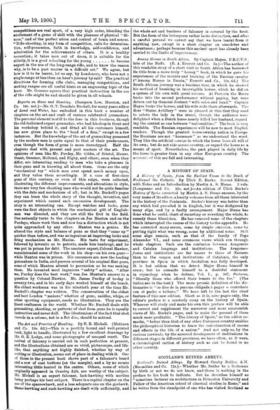Experts on Guns and Shooting. (Sampson Low, Marston, and Co.
14s. net.)—Mr. G. T. Teesdale Buckell, for many years editor of Land and Water, has embodied in this book a number of chapters on the art and craft of various celebrated gunmakers. The personal element is still to the fore in this business, though the old-fashioned expert gunmaker, who had hi shop in front and his workshop behind it, and fitted all his customers himself, has now given place to the "head of a firm," except in a few instances. But the knowledge of the art of gunmaking possessed by the modern men is quite equal to that of their predecessors, even though the form of guns is more stereotyped Half the chapters deal with present and past masters of the art. The opinions of men like Mr. Purdey, Mr. Gibbs, of Bristol, Messrs. Grant, Greener, Holland, and Rigby, and others, even when they differ, are interesting reading to men who take a pleasure in their guns and in knowing all about them. Guns are the only "mechanical toy" which men ever spend much money upon, and they value them accordingly. If a case of first-class guns of this century, or even of this reign, were collected, illustrating the different improvements, and alterations in style, there are very few shooting men who would not be quite familiar with the date and mechanism of all; but in Mr. Buckell's pages they can learn the whole story of the thought, invention, and experiment which caused each successive development. The story is an interesting one. Except watches and locks, guns were the first objects to which the mechanical gift of English- men was directed, and they are still the first in the field. One naturally turns to the chapters on Joe Manton and on the Purdeys, whose work then and now has a distinction which is not quite approached by any other. Manton was a genius. He altered the style and balance of guns so that they "came up" quicker than before, and was as ingenious at improving locks and firing mechanism as Mr. Maxim. His taste for experiment, followed by lawsuits as to patents, made him bankrupt, and he was put in prison for debt. The amateur expert, Colonel Hawker, superintended some of the work in his shop—on his own guns— while Manton was in prison. His successors are now the leading gunmakera in India, and possess several of his original flint guns, some of which Manton altered to percussion as he was making them. He invented most ingenious " safety " actions. "After me, Purdey does the best work," was Joe Manton's answer to a question by Colonel Hawker. Mr. James Purdey of to-day is seventy-two, and in his early days worked himself at the bench. His oldest workman was in his ninetieth year at the time Mr. Buckell's chapter was written. The conservatism of the oldest and best London "makers," whether of guns, saddles, whips, or other sporting equipment, needs no illustration. They are the finest craftsmen in the world. Whether Mr. Buckell deals' with gunmaking, shooting, or patterns of shot from guns he is equally instructive and never dull. The illustrations of the fact that shot travels in a column, not in a flat disc, should be noticed.






































 Previous page
Previous page